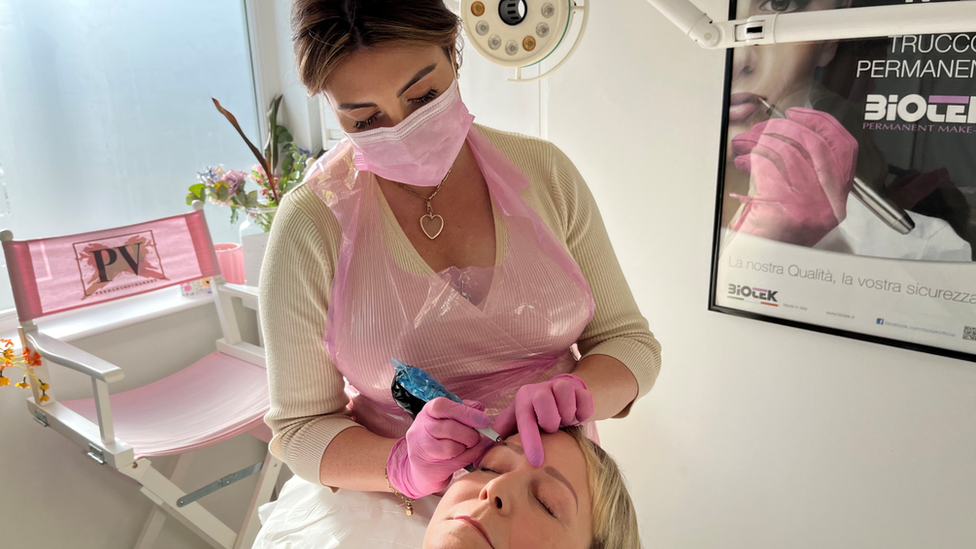'A mole smaller than my little fingernail was cancer'
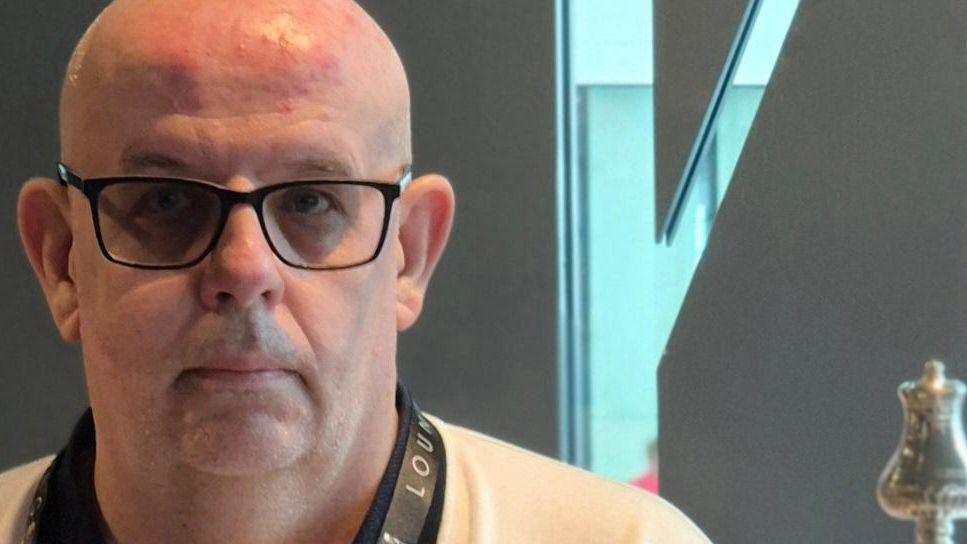
John Cleeton endured seven surgeries during his skin cancer treatment
- Published
Back in 2012, John Cleeton could never have imagined that a mole, smaller than his little finger's nail, would lead to seven surgeries.
The 57-year-old import manager from Ipswich was diagnosed with skin cancer that led to an aggressive seven-year battle.
With added support from the "extremely valuable" Skin Cancer Support Group at Ipswich Hospital, Mr Cleeton was given the all clear at the end of 2019.
The month of May marks skin cancer awareness month with Sunday also being B-RAF Melanoma Awareness Day, external that Mr Cleeton is keen to share his story for.
In late 2012, Mr Cleeton went to see his doctor about a concerning mole on his stomach that led to a stage two skin cancer diagnosis and surgery to remove the mole.
However further scans showed the cancer had spread to his lymph nodes, leading to further surgery to remove these.
Speaking about the initial diagnosis, Mr Cleeton said: "I had to tell somebody.
"When I was diagnosed, it was almost five years to the day when I lost a friend from a different type of cancer."
For just over four years after this, Mr Cleeton remained cancer free.
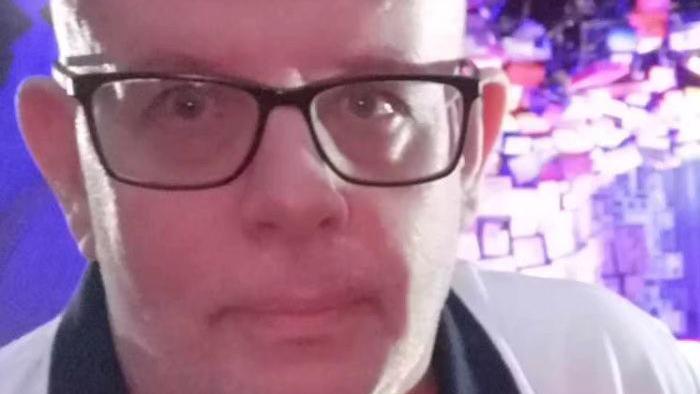
Mr Cleeton developed tumours in both his lungs as his skin cancer spread
However, in 2017, a lump was then found in Mr Cleeton's left breast that led to a mammogram and a biopsy to remove it but things were just escalating.
"Nine months later it came back big time in 2018," he explained.
"I'd gone for just a check-up because my scans had been clear in the January and a lump was found along my original scar line. I found out that was another tumour."
As well as this, doctors found another tumour in Mr Cleeton's right lung and diagnosed him with stage four skin cancer.
Several months later, in July 2018, another tumour was found in his left lung which doctors said was inoperable.
Mr Cleeton was instead offered nivolumab and ipilimumab immunotherapy that blocks a protein, which stops the immune system from working properly and attacking cancer cells.
While he endured some serious complications, including being diagnosed with viral meningitis at one point, Mr Cleeton was given the all clear on 2 December, 2019 following the treatment.
His advice to anyone is "follow your gut and if [a mole] looks or feels wrong get it checked out".
'It's a joy'
Since 2017, Mr Cleeton has been attending the Skin Cancer Support Group at Ipswich Hospital, external that is held every other month.
It was set up 13 years ago by Rachel Alexander, 51, the Macmillan skin cancer nurse specialist and department lead at the hospital.
Following discussions with others within the hospital it was determined there was a real patient need for such a group.
It allows them to come together to offer support, share stories as well as hear from guest speakers and enjoy fun activities like laughter yoga.
"For me it's a joy and it's a lovely extension of support which we're really proud of," Mrs Alexander said.
"I've had people say before that they've had skin cancer, it's affected them and their upset by the diagnosis and maybe family members don't realise the severity of it.
"They think it's just a skin cancer and it's been removed so it's all done now but it's just as serious as a breast cancer diagnosis or a prostate cancer diagnosis."
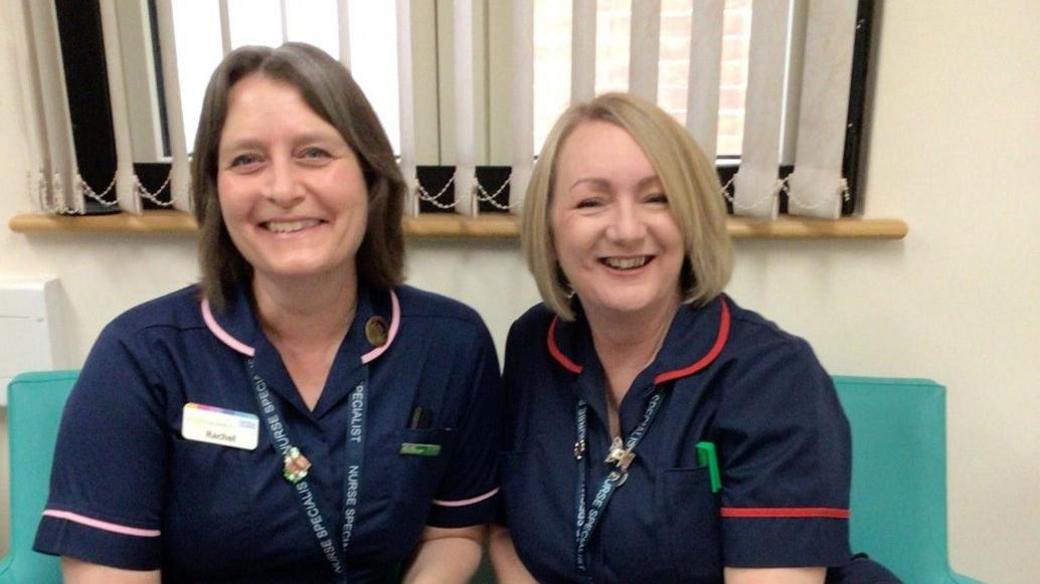
Rachel Alexander (left) and Jo Kirby (right) run the Suffolk Skin Cancer Support Group at Ipswich Hospital
One moment from the group that Mrs Alexander said really stuck with her was a patient who revealed she had developed a fear of the sun since her skin cancer diagnosis.
"When she opened up the curtains in the morning and saw it was a sunny day she would almost dread the day," Mrs Alexander said.
"By sharing it in the group we were able to allay a bit of the fear and talk through rationalising it because that was really upsetting for her."
Jo Kirby, 55, is a skin cancer nurse specialist at the hospital and helps run the group with Mrs Alexander.
She described the group as "very warm" with a "friendly environment".
"They are an amazing group of people and they all get on really well together," she said.
Melanoma's ABCDEs
Mrs Kirby urged everyone to become familiar with the ABCDEs of melanoma, external that can help detect changes in moles.
She also highlighted a poignant poem, external detailing the issues patients face that skin cancer isn't seen as the same as other cancers.
B-RAF Awareness Day, external helps highlight the B-RAF gene that is one of three of the most common gene mutations in melanoma.
Determining a skin cancer patient's B-RAF status allows doctors to ensure they are being given the correct treatment.
According to Melanoma UK, around 40 to 50% of melanoma patients have this gene.
Follow Suffolk news on Facebook, external, Instagram, external and X, external. Got a story? Email eastofenglandnews@bbc.co.uk, external or WhatsApp us on 0800 169 1830
Related topics
Stories like this
- Published16 January 2024
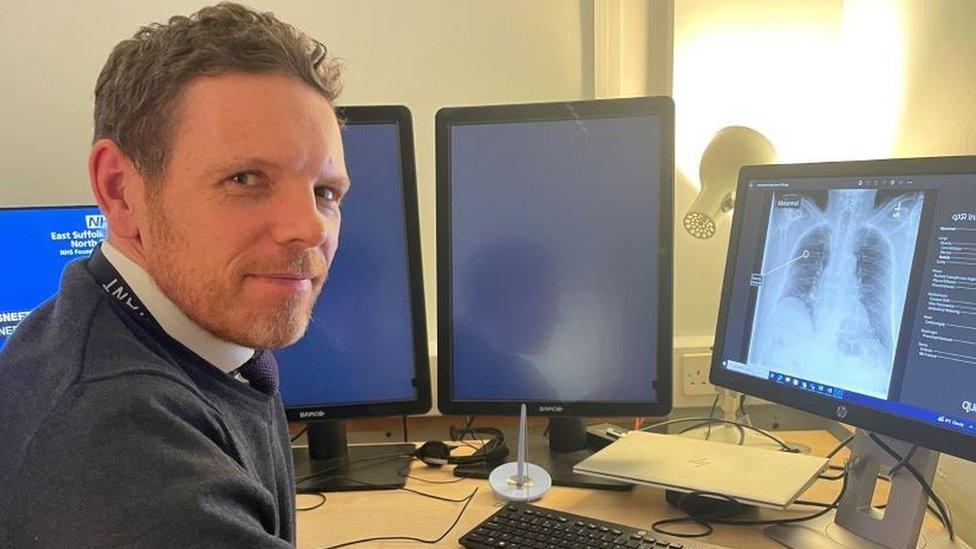
- Published26 January 2024

- Published11 October 2023
